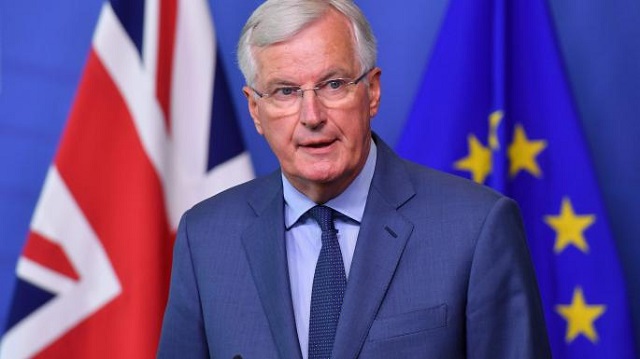
Belfast, United Kingdom | AFP | The European Union’s chief Brexit negotiator Michel Barnier on Monday warned Britain that its departure from the bloc later this week would have “negative consequences” and only ever be an exercise in “damage limitation”.
In a speech at Queen’s University Belfast, the Brussels diplomat charged with agreeing an EU-UK free trade deal, said nobody had yet convinced him of the “added value of Brexit”.
“It is absolutely clear that there will be negative consequences,” Barnier said on a visit to Northern Ireland after meeting members of the devolved assembly in the city.
“Whatever agreement we reach on our future relationship, Brexit will always be a matter of damage limitation.”
Britain will become the first country to leave the bloc at 2300 GMT on Friday, ending nearly five decades of membership.
Barnier had warned earlier Monday during a visit to Dublin for talks with Irish Prime Minister Leo Varadkar that London would have to “rebuild everything” in its new relationship with the EU.
Picking apart some of the pro-Brexit camp’s main arguments for its departure, Barnier said the bloc allowed members states “to speak with other superpowers as equals”.
“Brexit is meant to be about ‘Global Britain’,” he said, referring to a frequently used UK government phrase.
“But, for us, frankly speaking, it is the EU that helps make member states more global,” he said in a clear warning to other countries eyeing Brexit closely for their own futures.
“There is no way that any of our countries, alone, could have the same impact.”
– Cliff edge –
Once Britain has left the EU, it will begin an 11-month transition phase during which existing arrangements remain unchanged.
British Prime Minister Boris Johnson wants to agree the terms of the future relationship, modelled on the EU’s free trade agreement with Canada, by the end of that period.
Varadkar, who is fighting a general election on February 8, said at a joint press conference with Barnier that the timetable would be “very challenging”.
Barnier said he would present a draft negotiating mandate to the bloc’s member states next Monday.
EU ministers are then set to agree their joint mandate on February 25 ahead of a meeting of the European Council in March.
Barnier added there was “no time to lose”, warning of “the risk of a cliff edge” change in relations at the end of the year.
“If we have no agreement, it will not be business as usual and the status quo. We have to face a risk of a cliff edge, in particular for trade,” Barnier said.
– No compromise –
Barnier also used his Irish visit to reiterate the need for checks on some goods travelling from Britain to Northern Ireland — which Johnson maintains will not be needed.
“The UK has agreed to a system of reinforced checks and controls for goods entering Northern Ireland from Great Britain,” he said.
“I understand the fears of negative economic fallout expressed by some about these checks. But Brexit unfortunately has consequences that we must manage.”
Frictionless trade was “impossible” and checks were “indispensable”, he said in his speech.
Meanwhile Varadkar argued the bloc was in “a very strong position” in the upcoming talks given the remaining 27 members’ collective size compared to Britain.
“We have a population of 450 million people and the single market is the largest economy in the world,” he said.
“But I don’t think we have to see it as a contest.”
In a separate BBC television interview broadcast on Monday, the Irish leader also warned Brussels would not accept anything less than a comprehensive free trade agreement with Britain.
London indicated earlier this month it could seek a piecemeal post-Brexit deal with the EU that leaves some issues unresolved but still lets it break free from the bloc at the end of the year.
But Varadkar said: “That isn’t something that will fly in Europe.”
Barnier said in Belfast there would be “no compromise on the single market for us”.
 The Independent Uganda: You get the Truth we Pay the Price
The Independent Uganda: You get the Truth we Pay the Price





